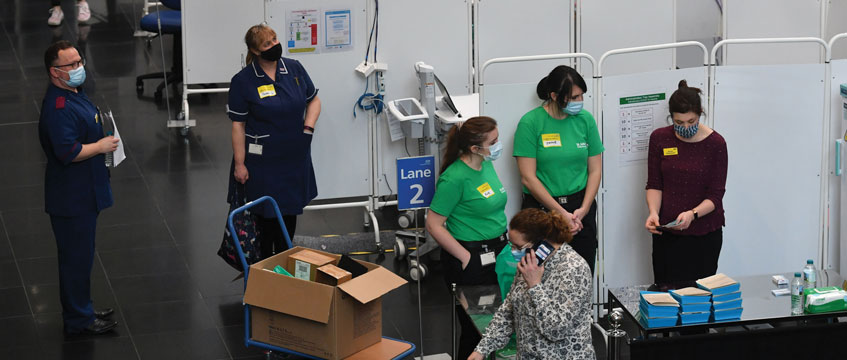With the NHS embarking on the largest mass vaccination programme in its history, a range of venues – chosen for location and operational capacity – have proved central to the emergency roll-out and adapted for temporary use. But when Covid-19 vaccination could become a regular event, what scope is there to re-use these venues in the future?
Vaccination centres need to be accessible and, to the extent possible, pandemic resilient. While the decision on the physical appropriateness of any venue is up to NHS England, landlords and tenants considering whether to offer their properties for mass vaccination have a number of things to consider.
Pandemic planning
2020 heralded some revolutionary changes to use classes and, where relaxations on development control have been driven by temporary, emergency needs during the Covid-19 pandemic, landowners need to know where they stand longer term.
From 1 September 2020, the provision of vaccinations will likely count as use within class E(e) (provision of medical health or services). Doctors’ surgeries, chemists and health centres are clearly on safe ground here, but for everyone else it pays to think more carefully. The creation of the new general-purpose use class E rolls up broader commercial uses, and does away with the need for permission for change of use where you already operate as an office, restaurant or indoor sports facility, for example. Learning centres, libraries, museums or other community spaces (being within classes F1 and F2) do not benefit from such flexibility, so permission would still be needed. That said, there are new rights in the Town and Country Planning (General Permitted Development) (England) (Amendment) Regulations 2020 operational for the whole of 2021 that enable land in any class to host activities from a different use for a maximum of 28 days. This might just be enough for overspill capacity at the busiest times of vaccination, but this is a hard deadline.
On the separate issue of building the structures needed for vaccination, there might be helpful temporary planning relaxations. Last spring, the Town and Country Planning (General Permitted Development) (Coronavirus) (England) (Amendment) Order 2020 put in place a new Part 12A to the General Permitted Development Order (GPDO), enabling emergency development on land already owned, leased, occupied or maintained by a local authority or health service body. Provided new buildings did not exceed six metres, on a position within 10m of the boundary, or 18m to the highest part of the roof (or above ground generally), development was permitted. This assisted with the immediate ravages of the virus, but its effects were temporary. The rights were in place initially only until 31 December 2020 (now 31 December 2021), and temporary works had to be removed within 12 months of installation.
Roll into 2021, and it may be possible to turn again to the regulations for temporary constructions. These permit development by or on behalf of the crown, on crown land, in order to prevent a pandemic, reduce, control or mitigate its effects or, broadly, take any other action in connection with it (although the 12 months limit applies again).
Lease of life
In relation to leasehold documentation, tenants might well be concerned about restrictions on their property’s use. Landlords routinely limit the potential uses in their buildings, possibly preventing widescale public access or, even where temporary flexibility in use is granted, limitations on the scale of that side enterprise, and the length of time it lasts for. There are almost certainly prohibitions on the grant or creation of any formal, legal interests through permitting third parties to occupy, share, license or sublease the space. Without express landlord approval, entering into an agreement with the NHS is clearly likely to trigger breaches of the alienation covenants in most leases. Less obvious perhaps, but we routinely see tenant covenants that prevent the keeping of deleterious materials on site, which could include the vaccine or used syringes.
Landlords meanwhile may be concerned that even good intentions in permitting temporary flexibility, or indulging a technical lease breach by a tenant, could have hellish consequences. They could also be under obligations not to consent to occupation by parties outside of defined classes. In estate scenarios, where the landlord must balance the needs of numerous tenants, it could find itself liable for not enforcing identical lease covenants effectively, or sanctioning or creating the circumstances for an actionable nuisance.
At the start of this vaccination programme, these concerns might feel largely academic. It would arguably be difficult for any landlord to object to a change of use without sustaining serious reputational damage. Also, to the extent the courts’ discretion became a factor in future injunction proceedings or a claim for relief from forfeiture, for example, the broader policy implications of finding against the tenant are likely to be thought through carefully.
Moving forward, it may be possible to pre-empt the possibility of a seasonal repurposing, hard-baking flexibility into new or varying existing lease documents. Insurers will need to be onboard, considering new public liability risks. Still, such flexibility could become essential to sector-specific business continuity strategies, considering how many large entertainment or community venues have been forced to close.
Looking forward
The future is bright. The life sciences sector is burgeoning, and with its nimble start-ups making the most of the new Class E, it could serve as a catalyst for all manner of creative uses. Still, landowners and operators should now factor in longer-term pandemic resilience, beyond the temporary fixes of short-term planning flexibility by rushed regulation or even lease covenant relaxations by hope, not judgment. If Covid-19 vaccinations are to be a regular feature of our winter months, so too must be the tools to provide the same with confidence.
Clare Harman Clark is a senior professional support lawyer, Lauren Fendick is a real estate partner and Al Watson is a planning partner at Taylor Wessing







